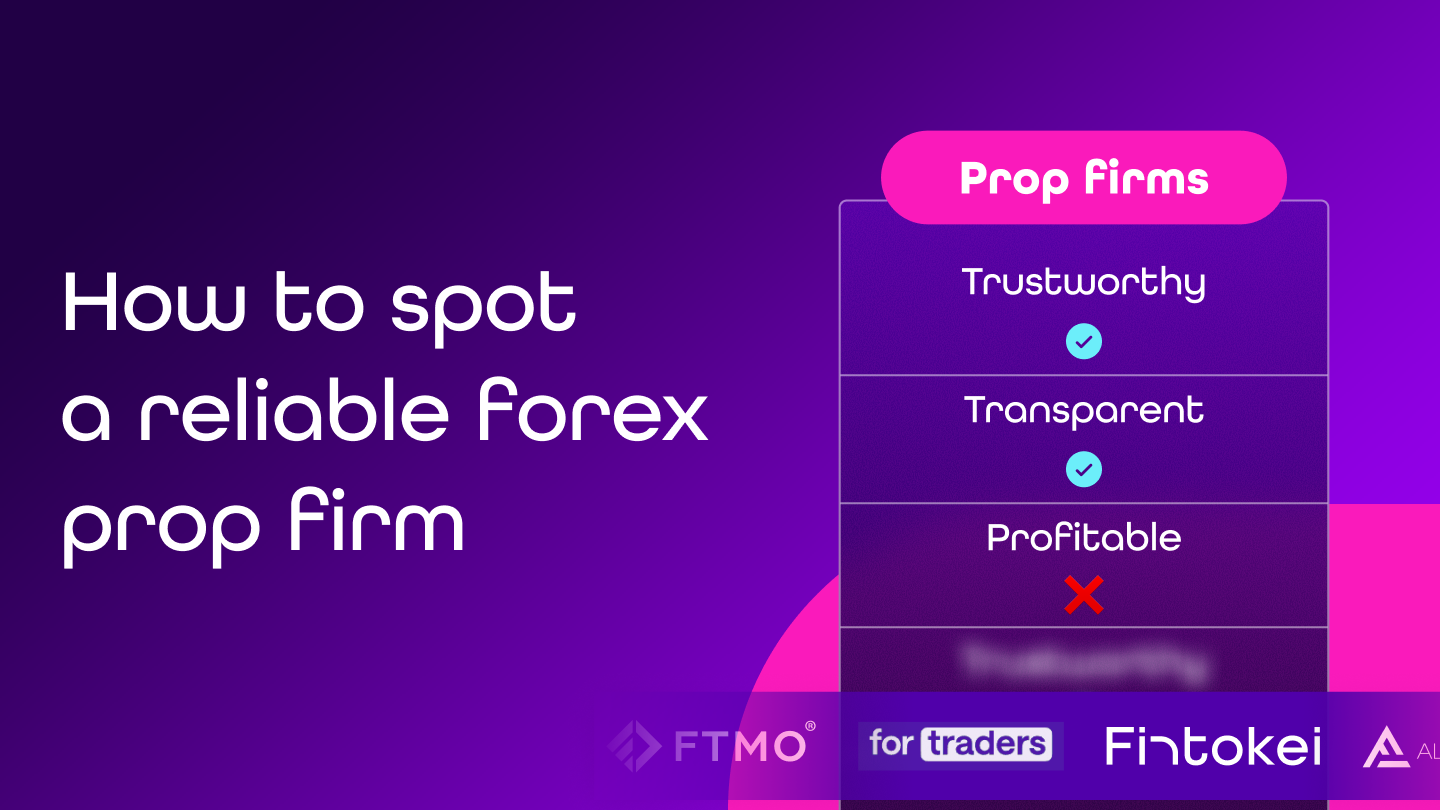How to choose the best forex prop firm
Looking for the best forex prop firm, but not sure where to start? In this guide, you'll learn how top prop trading firms work, what separates top proprietary trading firms from shady ones, and how to choose the right fit based on your goals, skills, and trading style.

What is a prop firm and why should you care
Trading with $100,000 when you only have a few hundred in your account? Sounds like fantasy—but that’s exactly what prop trading firms offer.
Of course, it’s not charity. These are proprietary trading firms looking for skilled traders. If you can prove yourself—usually through a trading challenge—they give you access to their capital. You trade and make profits, they reward you with a certain percentage of your profits in the form of payouts. A fair deal, no strings (if you choose the right firm).
PROP FIRM = a company that gives you access to funded accounts if you pass their challenge. A percentage of your profits is usually paid out as payouts (or performance rewards).
This model is the backbone of many of today’s best funded prop firms and top trading prop firms, especially in the forex space.
Prop firm versus broker
A lot of new traders confuse these two terms, so let’s clear it up once and for all.
A broker is a company (or an individual) that gives you direct access to the financial markets. You open an account, deposit your own money, and trade. You keep 100% of the profits—but you also carry 100% of the risk.
A prop firm, on the other hand, does not provide a standard trading account. Instead, you go through a challenge, and if you pass, they give you access to a virtually funded account. You trade with their virtual money and get paid a certain percentage of your profits.
This difference is key when comparing the best prop firms forex with traditional brokers. Brokers are about independence and full control. Prop trading firms are about leverage, structure, and growth—if you play by the rules.
Who should consider trading with a prop firm?
A prop trading firm makes the most sense when:
- You don’t have enough personal capital but believe in your trading skills.
- You want real market experience without risking your own money.
- You enjoy structured challenges and want to push your limits.
- You have limited time or budget but still want to start trading seriously.
But a quick warning: a prop firm is not a shortcut to instant riches. It’s a gateway. Whether you succeed or not depends entirely on your discipline, strategy, and mindset.
Some of the best prop firms are looking for consistent, disciplined traders—not gamblers. And that’s exactly the mindset you need if you want to grow with one of the top proprietary trading firms in the game. With Fintokei, for example.
How the best prop trading firms work
Prop firms do not just hand you free money. But if you know what you’re doing, they can open the door to serious capital and real profits.
The model is simple: they have the virtual money, you (hopefully) have the skill. If you prove it, they give you a shot.
That’s the core setup behind most top prop trading firms today. Whether you’re new or experienced, the process usually starts the same way.
What is a challenge (aka evaluation phase)
Most prop firms require you to pass a challenge—a test run where you show your trading skills under specific conditions:
- You get access to a demo account (e.g., $10,000 or $50,000).
- You must hit a profit target (usually around 10%).
- You must respect the rules (e.g., max 5% loss limit).
- You often have a time limit or a required number of trading days.
If you succeed, you move on to a verification phase—or get a virtually funded account directly.
💡 Fintokei tip
Do you know which trading challenge should you choose?
Who takes the risk and what does that mean for you
You might think: “If I’m trading with someone else’s virtual money, then there’s no risk, right?” Not quite.
- You carry psychological risk and the cost of the entry fee.
- Every trade matters. If you break the rules, your account is gone—often instantly.
That’s why even the best funded prop firms only want traders who are sharp, consistent, and calm under pressure.
7 criteria for choosing the best (forex) prop firm
Picking the best prop trading firm isn’t just about who offers the biggest virtual capital or the lowest fees. If you’re going to take on a challenge, you need to know exactly who you’re partnering with. Here are seven things to check before you commit to any forex prop firm:
- Trust and reputation
Start with the basics: is the company legit? A surprising number of prop firms pop up and disappear within months. Do your homework:
- How long has the firm been around? (More than 1–2 years is a plus)
- What are traders saying on Trustpilot, Reddit, YouTube, or Discord?
- Is there real, transparent info about the company—team, address, legal entity?
If a firm has delayed payouts, sudden rule changes, or ghost support—run.
- Clear and fair results
Every prop firm has rules—but some are fair, others feel like traps. Pay close attention to:
- Profit target (how much you need to earn)
- Max loss limit (how much you’re allowed to lose)
- Minimum trading days
- Banned strategies (news trading, using EAs, scalping, etc.)
If the rules are too complicated or written in legalese, that’s often on purpose. Top prop firms keep it simple and transparent.
- Fees and return on investment
Entry fees are normal—but they should make sense. Check:
- How much you pay to join (smaller accounts should cost less)
- Whether you get your fee back after you pass the challenge
- Whether there are hidden costs (e.g., “account maintenance” or reactivation fees)
Red flag: If the firm charges you monthly just to keep the account “active,” it’s likely more interested in your wallet than your skill.
- Payout conditions
This is what really matters—how and when do you get paid? Look at:
- Payout frequency
- Payout methods
- Percentage of profits you can withdraw
Even the best funded prop firms can have weird payout rules. Read the fine print.
- Trading platforms and technical setup
If your platform crashes mid-trade, it’s game over. Make sure the firm supports trusted trading platforms (like MetaTrader 5, cTrader, a stable web platform, or even TradingView, which is considered to be the top trading platform by many), fast and reliable data feed, mobile trading options. Top proprietary trading firms invest in stable tech. Others cut corners—at your expense.
- Customer support
Support doesn’t matter—until it does. And then it’s everything. Watch for:
- Response times (live chat, email, Discord?)
- Whether you get real help—or just an AI chatbot
- Language options
Smart move: Ask a question before registering. See how they respond.
- Education and community
Not essential, but helpful—especially if you’re learning. Check if the firm has a blog, YouTube channel, or learning hub, a Discord or Facebook community, and real examples of funded traders and payouts. The best forex prop firms help you grow, not just pass a test.
What kind of prop firm is right for you
| Trader type | What you need | What to look for | What to avoid |
| Beginner(just starting, limited live trading) | A safe space to learn | – Simple rules– Longer time to pass– Low-cost entry– Educational content & community | – Complicated rules– Short deadlines– No real support |
| Intermediate(some experience, ready for funding) | Growth and access to bigger capital | – Two-step challenges– Fair profit split– Reliable payouts | – Hidden conditions– Low loss limits– Tight rules under pressure |
| Slow-paced trader(swing or position trader) | Flexibility and low stress | – Long timeframes– Lower profit targets– No limits on strategy | – Daily trading requirements– “Speed run” type challenges |
| Busy trader(limited time, wants to give it a shot) | Speed and simplicity | – Instant funding or single-phase model– Loose rules on trading frequency– Quick activation | – Multi-phase models with strict timelines– High pressure to stay active |
💡 Fintokei tip
You’ll want this: a beginner-friendly glossary of prop trading terms.
Red flags: When the “best prop firm” isn’t really the best
❌ Unclear or changing rules – Rules are missing, vague, or get updated without notice. Sometimes, you can’t even see the full terms until after you sign up.
❌ No reviews or bad reputation – The firm is new, with no verified payout history. Traders report blocked accounts or missing payments.
❌ Too-good-to-be-true promises – “Make $200K in a week,” “100% success rate,” “No risk.” The reality? You’re heading into a trap.
❌ Silent or unhelpful support – Only bots respond, and no one actually solves issues. Test the support before you commit.
❌ Hidden fees – Monthly “account maintenance,” unexpected withdrawal or reactivation fees = major red flag.
Final tips and recommendations
Trading is not a sprint. Prop firm challenges can feel like a fast track to quick money—but real success takes time, discipline, and mindset.
- Start slow. Treat your first challenge as training. If you fail, no big deal—you’ll still walk away with valuable experience.
- Know the rules cold. Don’t just skim them—understand every detail. What happens if you hit -5% loss limit? How many trading days do you have left? Surprises can kill your account.
- Lean on the community. Read reviews. Ask questions. Learn from others’ mistakes before you make your own.
- Failure isn’t the end. Every failed challenge teaches you more than five trading tutorials. Keep going. You will get better.
The best forex prop firms are the ones that let you grow—fairly, transparently, and without shady tricks. Pick one that plays by the rules. Then show them what you’ve got.


